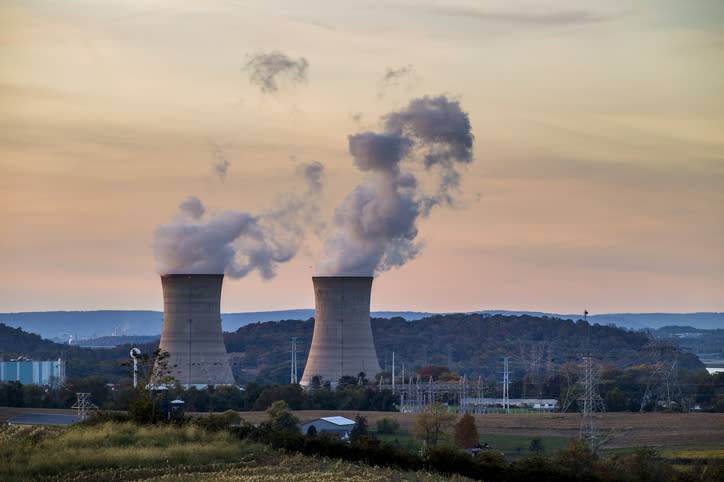Pennsylvania's Nuclear Fumble Will Be a Costly Climate Mistake
Unless an eleventh-hour deal is reached, Pennsylvania is poised to sabotage its near- and long-term climate change goals. The holdup: $1.77.
That's the estimated increase to the average electricity customer's monthly bill that would result from subsidizing the state's nuclear-power plants. Even if the cost turns out to be triple that amount, the data and regional energy realities suggest the benefits are worth it. Nuclear power generates 42% of the state's electricity (the U.S. average is 20%) and is responsible for 93% of its carbon-free power production (wind and solar account for just 4% of that total).
That will radically change if Exelon (NYSE: EXC) and FirstEnergy (NYSE: FE) proceed with plans to retire nuclear power plants representing 2,700 megawatts of carbon-free power capacity. Fortunately for the climate and investors, similarly dire realizations forced Illinois, New York, and New Jersey to approve financial aid at the last minute. Will Pennsylvania do the same?

The steam cooling towers at Three Mile Island. Image source: Getty Images.
Exelon is trying a well-worn strategy
The battle brewing in Harrisburg comes down to semantics and ideology. Similar to many other states, Pennsylvania currently has a Renewable Portfolio Standard (RPS) designed to subsidize renewable power and mandate that such sources reach certain levels of market share by certain years. The goal of a state's RPS is to decarbonize the electric grid. The problem is that nuclear power achieves that goal, but it isn't renewable.
There's a simple path forward. Other states that lean heavily on nuclear power have updated the legal language to replace "renewable energy" with "clean energy" and provide zero-emission credits (ZECs) to any power source that qualifies, including nuclear. For instance, Exelon promised to close its Quad Cities and Clinton nuclear facilities in Illinois without financial assistance. Politicians balked, the power generator held firm, and ZECs were written into law at the last minute.
The outcome wasn't too surprising, considering the two nuclear-power plants accounted for 12% of the state's total electricity and more carbon-free electricity than Illinois, Colorado, and Washington combined had installed at the time. Exelon used the same playbook to wrestle ZECs into existence in New York, while the Public Service Enterprise Group borrowed it to do the same in New Jersey (where Exelon owns a 43% stake of the Salem nuclear plant).
Exelon is now doing the same in Pennsylvania, promising to close the Three Mile Island nuclear plant (the reactors owned weren't involved in the infamous 1979 disaster) by 2021. The shutdown is scheduled to start this fall. FirstEnergy has proposed to do the same with Beaver Valley on the opposite end of the state. Will it work?

Image source: Getty Images.
A healthy dose of nuance is needed
The Pennsylvania legislature has proposed broadening zero-carbon subsidies, but appears poised to miss a June 1 deadline to pass the bill. Environmentalists have decried the subsidy as keeping nuclear afloat when that money -- an estimated $500 million per year -- could be redirected to wind and solar.
That's a fair argument, although the state has poor renewable energy potential. It best wind-power potential resides on state game lands or interferes with migratory patterns of bats, putting it out of reach. Meanwhile, solar power potential across the state is relatively low, as Pittsburgh (first) and Philadelphia (ninth) are two of the cloudiest cities in the country.
Natural gas groups have also opposed ZECs in the state, although that's because they're eyeing nuclear's market share. Pennsylvania ranks second in the country in natural gas production, behind Texas, while Appalachia accounts for 40% of the country's natural gas produced from shale resources. What's more, the natural gas produced in the region is coveted for its natural gas liquids -- ethane, propane, and the like -- which makes the price of electricity-producing methane that much cheaper. That's why natural gas makes up 96.5%, or 15,200 megawatts, of new proposed generation capacity in the state.
While it's true that some nuclear power plants in the state aren't economically competitive, that calculus changes if markets begin to value the avoidance of carbon emissions. Exelon noted on its first-quarter 2019 earnings conference call that the company "has produced more clean energy than any other company in the United States by a factor of two." It's certainly doing everything it can to preserve the economics of its fleet, which just delivered the most efficient operations of any quarter in more than 10 years. Will politicians reward that effort?

Natural gas, not renewables, will replace shuttered nuclear capacity. Image source: Getty Images.
Will Pennsylvania change course?
If Pennsylvania fails to value nuclear power as a tool for combating climate change, then the state will see immediate ramifications. The state, already fifth in the nation in total carbon dioxide emissions, will see its climate impact spike as natural gas gobbles up increasing market share in the electric grid. Air quality will deteriorate. And the United States will fall further away from meeting its climate change goals. All over $1.77 per month.
What happens between now and June 1 also matters greatly for shareholders of Exelon and FirstEnergy. The companies will be forced to send off Three Mile Island and Beaver Valley to early retirements, each more than a decade before their operating licenses expire. That would result in significant noncash charges for accelerated depreciation, which would impact earnings in the near future. Therefore, investors and analysts are hoping the playbook that worked in Illinois, New York, and New Jersey proves successful once again.
More From The Motley Fool
Maxx Chatsko has no position in any of the stocks mentioned. The Motley Fool has no position in any of the stocks mentioned. The Motley Fool has a disclosure policy.

 Yahoo Finance
Yahoo Finance 